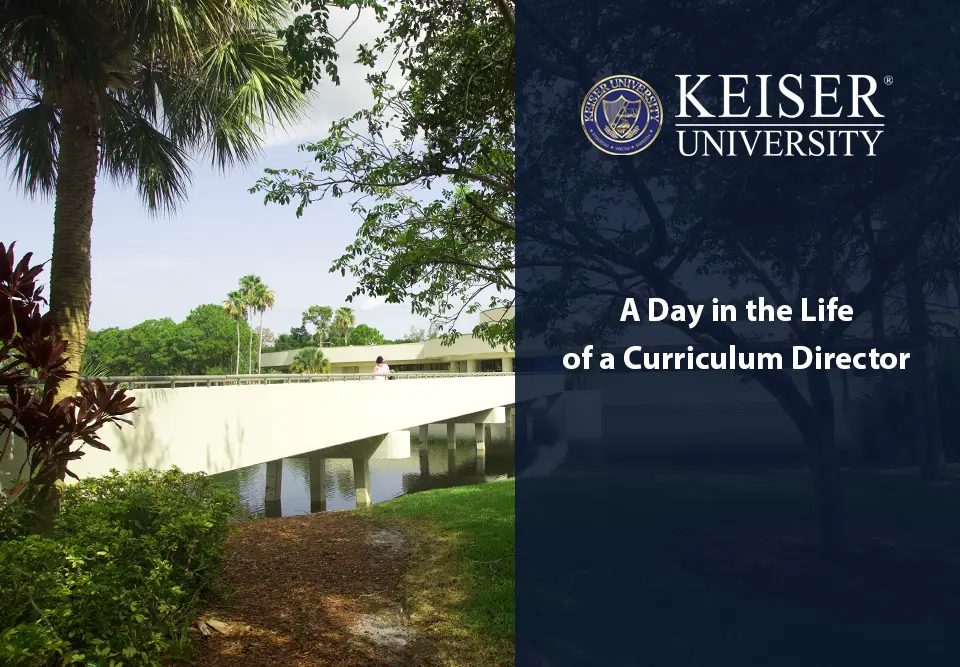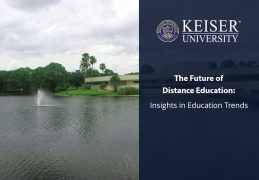Are you currently working in education and have your sights set on an academic leadership role? Perhaps you have put in your time as a teacher and are eager to move on to bigger things, like shaping curricula and improving both student and teacher outcomes.
For many experienced educators, advancing into curriculum director roles can be a logical progression. Exploring a day in the life of a curriculum director who now works as one of the deans of Keiser University’s graduate school, you can get a better feel for what this work entails and why it matters.
Why Curriculum Directors Matter in Modern Education
In our education system, curriculum directors play a pivotal part in ensuring that the content taught in the classroom (and the way it is taught) aligns with program, school and even district objectives. Meanwhile, these professionals are also responsible for continuously reviewing curricula to ensure that educational content remains relevant to the latest trends and technologies — recommending changes and improvements as needed while serving as a liaison between teachers and administrators throughout the process.
Who Should Read This – Future Education Leaders and EdD Candidates
For those currently in the education field, be it in a teaching or school administration career (or a similar role), this article details the day in the life of a curriculum developer. By gaining valuable insights into what a day in the life of a curriculum specialist or developer looks like, you may be better able to determine whether this career path is right for you as a future education leader or even a Doctor of Education (EdD) candidate.
Meet the Curriculum Director
Our team at Keiser University had the chance to interview Ashlee Robertson, PhD, who now serves as one of the deans for our graduate school. While she is not a curriculum director at Keiser, she does serve on the curriculum assessment team for the entire university and on the graduate school’s curriculum committee. Previously, she served in a curriculum director role at the K-12 level.
Background and Current Role in Education
Dean Robertson has been with Keiser University for 14 years and has witnessed a great deal of curriculum changes along the way. Today, she serves on both the graduate school curriculum committee and the curriculum and assessment team, where she is “very involved in mapping assignment design, assessment design and supporting the university in that avenue as well.”
Journey to Pursuing a Doctorate
Prior to earning her doctoral degree, Dr. Robertson explains that she received her master’s degree in K-12 Education. From there, “that’s really where a lot of the formal education regarding curriculum came in. So, I learned how to develop curriculum all the way from elementary school up through high school and how it builds on each other.”
Following her master’s degree, Robertson earned her PhD in Curriculum and Instruction, where she built upon many of the theories and concepts from her master’s program and “fell in love with curriculum mapping.”
Why Keiser University for Graduate Studies?
Although Dean Robertson did not attend Keiser University for her own graduate studies, she has assumed a central role in shaping the programs here — ensuring that the graduate school program content aligns with learning outcomes and objectives.
She explains how curriculum directors and designers at Keiser are constantly reviewing programs to make improvements and changes as needed, asking key questions such as, “How are our students doing on comp and board exams? How are they doing through their dissertation? What are the areas they’re struggling with at the end, and how can we build that better into the classes they are teaching throughout the process so that, when they get to the end of the program, they are well-prepared for those expectations we have?”
Dr. Robertson emphasizes how these questions are being asked continuously: “Our professors are working with external stakeholders twice a year through our advisory boards, and these are people who are actually out working in the field.”
A Day in the Life of a Curriculum Director
So, what does a “typical” day look like for a director of curriculum, anyway? Ultimately, this will vary greatly depending on the type of school and other factors, but most curriculum directors can expect to fulfill certain duties and responsibilities on a regular basis.
Typical Daily Schedule
Many curriculum developers and instructional coordinators work in K-12 schools (up to 36% of them, according to the U.S. Bureau of Labor Statistics) — including public, private and charter school options. However, colleges and universities may also hire curriculum directors. These roles tend to be full-time, mostly taking on standard business hours. These professionals generally work on site, reporting to an office at their assigned school.
While the exact schedule of events may vary from one curriculum developer to the next, the bulk of their daily work typically entails balancing meetings with team members, comprehensive lesson design and program evaluations. Throughout each day, these professionals must also maintain ongoing communication with educators, principals, administrators and other stakeholders.
Primary Duties and Responsibilities
Some general responsibilities of a curriculum director include:
- Curriculum planning and alignment.
- Instructional coaching.
- Reviewing existing curricula for effectiveness and alignment with program goals.
- Reviewing test scores and similar student assessments.
- Staying up-to-date on the latest industry and workforce standards.
- Working with administrators, educators and other stakeholders to better understand their needs.
- Ensuring policy compliance through curricula assessment.
- Offering instructional development opportunities to educators.
What Success Looks Like in This Role
Overall, success as a curriculum director means continuously reviewing and improving upon existing programs to help students get the most out of their education as possible. This success may manifest in different ways, such as notable improvements in students’ standardized test scores or even increased graduation/job placement rates.
Applying Doctoral Learning in the Field
Whether you are considering a PhD in Curriculum and Instruction or an EdD, when it comes to applying what you have learned in the field, keep in mind the following:
Skills Gained During the Doctoral Program
In a PhD program, you can expect to learn how to apply research practices in practical design analysis and reporting to better understand the effectiveness of current curricula. Likewise, students in this type of program learn about the social, historical and policy factors that affect curriculum development and instruction.
From a “soft skills” perspective, these PhD programs also help students develop their written and verbal communication skills through coursework, presentations, publications and more. This coursework can help aspiring curriculum directors sharpen their strategic thinking and research-based decision-making skills, too, both of which are essential in the development and refinement of effective educational programs.
Most Valuable Aspects of the EdD Experience
If you are leaning more toward a Doctor of Education degree, you stand to gain numerous practical skills from your experience that could apply to your future work as a curriculum director. In an EdD program, for instance, you have the opportunity to take part in project-based learning, gaining hands-on experience in applying essential concepts to real-world applications in education, instruction and curricular design.
Additionally, as part of an EdD program, you can hone your communication and collaboration skills to work with peers and faculty more effectively. These competencies could translate well to a future curriculum developer role, where you will be expected to collaborate with instructors, principals and administrators alike.
Support From Keiser’s Faculty and Resources
No matter if you end up in an EdD, EdS or PhD program working toward a curriculum director position, students at Keiser University enjoy the advantage of working with instructors and professors with proven experience in the field. These are faculty members who have served in these kinds of roles in their own careers and can assume somewhat of a mentor role with their students — guiding and preparing them for the realities of working in the field.
Meanwhile, Keiser offers a wide range of resources for graduate students, including a virtual bookstore, a dedicated Online Writing Studio and career services.
Advice for Aspiring Curriculum Directors and EdD Students
For educators considering pursuing an EdD or similar degree, Dean Robertson offers some practical advice.
Tips for Success in a Doctoral Program
Dr. Robertson encourages education professionals that a curriculum degree is “pivotal” for those pursuing roles in curriculum design and development. She stresses the importance of critical thinking in a doctoral program and how aspiring curriculum designers need to “constantly look deeper […] into the story behind what you’re doing.”
Overcoming Challenges in Leadership and Academia
Dean Robertson also explains how overcoming obstacles in both leadership and academia is part of growing as a professional. When a curriculum is undergoing major changes, she mentions how faculty have to go through a process of trial and error, and that “sometimes it’s hard for our professors.” However, by viewing challenges as opportunities to improve and practice, it is possible to grow not just as a professional but also as a leader.
Final Reflections on the Doctoral Journey
The journey to earn your doctoral degree can be challenging yet rewarding — but just about anyone with an advanced degree in curriculum design or a related field will echo similar sentiments about their experience.
Most Rewarding Experiences
As a curriculum director, being able to see the hard proof of your efforts paying off is among the most rewarding experiences for many. Whether that means higher standardized test scores, better job placement after graduation or other outcomes of success, Dr. Robertson elaborates, “Everything comes back to the learners, how we’re teaching them, how we’re designing for them, how we’re assessing for them, how we’re getting better for them and how they get the opportunities to practice, learn and demonstrate expertise.”
Would They Do It Again?
As Dean Robertson reflects on her challenges and successes along her career path, she maintains that the right doctoral degree and a commitment to open-mindedness can make all the difference for aspiring educational leaders. Specifically, she offers the following advice:
“Even if you’re scared of it, jump in. Learn it. Try it. Especially if you’re pursuing a doctorate degree, you will be an invaluable commodity for your institution if you have that background.”
FAQ: Curriculum Director Careers and EdD Programs
How long does it take to earn a Doctor of Education?
This can depend on many factors, including whether you are enrolled part or full time and how many credit hours your EdD program comprises. In general, however, an EdD takes anywhere from three to four years to complete.
What is the salary range for curriculum directors?
Various factors can affect the salary of a curriculum director, including location and the type of school for which you work. According to ZipRecruiter, however, the average curriculum director salary in the United States is about $77,000 per year.
How flexible is Keiser University’s EdD program?
Keiser University’s EdD program is designed with flexibility and versatility in mind, offering fully online classes with two concentrations to choose from: Curriculum Leadership and Education Leadership.
Ready to Take the Next Step?
Today’s schools need capable and knowledgeable curriculum developers, directors and specialists to ensure that what (and how) students are being taught in the classroom is applicable to program objectives and workforce needs. At Keiser University, we proudly offer graduate-level degree programs to prepare educators for curriculum director and related roles, including:
- Doctor of Philosophy in Instructional Design and Technology (PhD IDT)
- Doctor of Philosophy in Curriculum Design and Instruction (PHD C&I, CURR)
- Doctor of Education (EdD)
- Educational Specialist (EdS) in Instructional Design and Technology
Learn more about these programs and how they could assist you in your professional journey by reaching out to a graduate admissions advisor today. You may also take the next step by applying for admission now.






 The instructors at Keiser University impacted my life. They believed in my ability to become a great graphic designer, regardless of how I felt about my skills. KU helped to prepare me for the real world and got me to where I am today.
The instructors at Keiser University impacted my life. They believed in my ability to become a great graphic designer, regardless of how I felt about my skills. KU helped to prepare me for the real world and got me to where I am today.
